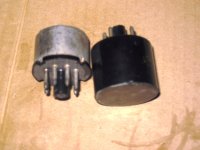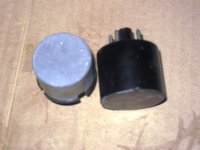What can anyone do with this information? Do you want a list of possible explanations? Why no testing information?
First of all I never thought that a thread I started years ago would be brought back from the dead.
Consider this.... there is much that has been said about capacitors changing the sound of amplifiers. Has there been any testing that could possibly prove that they do? All you have once again is someones trained ear hearing a slight difference.
The rectifiers I tried years ago showed very little difference in the B+ supply yet you could hear a difference.
Yes, Mr. Turner gave excellent basic knowledge in easy to understand detail. However, there are other characteristics of rectifiers less discussed that still affect circuit performance. I accept the facts but did not find the urge to pursue the subject by more elaborate measurement further.if you want to know more this page by Patrick turner is real good to read....powersupplies
Why should it bother you that a certain rectifier makes your amp better sounding? It is highly unlikely for us humans to be able to try every available permutation there is, we only know so much, it is natural. Moreover, manufacturers produce new type or change the design or manufacturing process or material of existing rectifiers all the time. It is no surprise if somebody find a certain rectifier sounded and measured better than the one you originally chose for your amp.... i will get depressed if by changing rectifiers my amp sounded better, that meant i did a lousy job building my amp... i go by what i have...
The sharing of knowledge and experience is the most valuable reason that this forum helps us. Anything you are willing to share from what you have?
The rectifiers I tried years ago showed very little difference in the B+ supply yet you could hear a difference.
When you say, you, you really mean just you. When Huggy said, ...I found a big difference, the treble much finer, the more medium forward (especially on the violin Grappelli and the bass a little shorter but faster . so I changed again for the EH and back ... I do not have an explanation, it's just my findings ... I thought to myself, if that was my rectifier, I'd wonder what was wrong with it if I actually had that much of an improvement with a new rectifier and I'd be checking it for condition and output. The new one is being credited with a big difference in the entire audio band. In my experience that would prove the other to be a bad or failing rectifier 100% of the time.
Last edited:
.... I would have abstained from any comment ...
We all need make that decision with each post. I've abstained thousands of times after having an initial reaction to post. Getting back to your original post, can you sum it up for us? What should we do with the information? Should we go with your comparison and when choosing to buy a new rectifier choose against the type you felt wasn't as good and buy the one you liked from a listening test with no information about the condition of the old rectifier? This is all relevent to the hobby.
Not at all. What problem? Please do not be discouraged. Your honest participation should help us all understand the subject a bit better. More details is simply more useful.if I had known that this would be a problem, I would have abstained from any comment ...
For whatever it is worth, I was using a single stage LC filter; cheap 5 or 10H Hammond choke, and a massive filter cap, 1200 uF, IIRC. I generally use LC filters wherever I can.
Win W5JAG
i agree. 12H+1mF much better than 4H+200uF+4H+200uF
ideal supply should be rock hard, think car battery. you cannot achieve that with vacuum diodes.
gas or mercury diodes are different and better animals
Last edited:
Anyone try SS before their tube rectifier?
i did.... i fashioned a tube rect from a discarded octal base...
in the PSET EL34 that i made, replacing the tube rect with an ss actually increased plate dissipation...
edit: i have done that once and then i realised, what for?
Attachments
I think that Tony probably meant that he always tries to make the power supply invisible to the amplifier, either by making the power supply, as far as possible, a perfect voltage source and/or by designing the amplifier to have very high PSRR.
yes, that is the design goal..
Yes, Mr. Turner gave excellent basic knowledge in easy to understand detail. However, there are other characteristics of rectifiers less discussed that still affect circuit performance. I accept the facts but did not find the urge to pursue the subject by more elaborate measurement further.
Why should it bother you that a certain rectifier makes your amp better sounding? It is highly unlikely for us humans to be able to try every available permutation there is, we only know so much, it is natural. Moreover, manufacturers produce new type or change the design or manufacturing process or material of existing rectifiers all the time. It is no surprise if somebody find a certain rectifier sounded and measured better than the one you originally chose for your amp.
The sharing of knowledge and experience is the most valuable reason that this forum helps us. Anything you are willing to share from what you have?
sure....but i am able to separate anecdotes and real engineering facts....
anecdotes i am not bothered about, more so if science can't explain...
Great, no problem Tony. Just like me, everyone including you is free to choose not to be a scientist, scientists being curious dedicated people working on phenomena science has not been able to explain. Being less experienced than you, I chose a more liberal open minded position to reduce babies being thrown away with the bath water.sure....but i am able to separate anecdotes and real engineering facts.... anecdotes i am not bothered about, more so if science can't explain...
i did.... i fashioned a tube rect from a discarded octal base...
in the PSET EL34 that i made, replacing the tube rect with an ss actually increased plate dissipation...
edit: i have done that once and then i realised, what for?
I didn't mean to throw several SS rectifiers in a tube base. Everybody has done that. Heck I have a half dozen of them with different rectifiers in the base and the base is filled with black silicone.
I meant soldering in diodes before the plates on the tube rectifier.
Yes. First you have to decide what the phenomenon is. It could beindra1 said:scientists being curious dedicated people working on phenomena science has not been able to explain.
1. different rectifiers can sometimes cause minor difference in amplifier sound
or
2. different rectifiers can sometimes cause people to report major differences in amplifier sound
The first phenomenon requires a physics explanation. The second requires psychology.
Here are some physics explanations:
a. different rail voltage
b. different PSU output impedance
c. different PSU ringing
d. different amounts of half-wave rectification ripple (caused by rectifier imbalance)
e. different ground currents
Note that all of these can be regarded as possible signs of weak design in the PSU or amplifier.
You have to take into consideration this board is made up by a lot of us Diyers and as such most do not have engineering degrees and or experience with companies such as Motorola or IBM so lets drop it down a notch or two. Most here employ the help of a free power design software and or build from a simple basic power supply design found in an old book or via the internet so power supplies aren't the best or possible completely thought out and as a result subject to a little noise. Most here are lucky enough to enjoy owning a scope, signal generator, and a few basic volt and ohm meters at best. Some like myself don't own some high grade measuring instruments that would probably be the Cats meow when trying to obtain some spot on measurements. I for one balance my love for audio along with my love for Target Shooting, reloading,and bullet casting. Each love demands money for those latest toys that make that particular love more fun. So in other words my money is spread out among my different interests and loves.
My particular experience with a known power supply design has had me wondering and I'm sure I'm not alone. I have a power supply that I made in my Akido 6SN7/6SN7 that is dead quiet. I've shifted/rolled different rectifiers into it and received different sonic results. I've rolled 5Y3's,5AR4's, 5U4, Number 80 with a conversion base (made by me) and a #83 Mercury rectifier. In addition a added set of low noise high speed SS diodes from the transformer secondary to the tube rectifier plates. Each had its own sonic impact sonic signature. Each particular tube swap didn't change the B+ more than a few volts either way so therefore there shouldn't be any difference..right? After all once can get + or - 10 volts easily as the day changes on the AC outlet if you monitor it. Early morning it will probably be highest and as the days load changes or people run the AC the power supply grid starts to dip.
There are some that will say that the circuit of the line stage is to blame and as a result of its complexity or lack of the result will be sonic differences. To others they will say the power supply design that is being used isn't quite as good as it shoud be. Then there will be people like myself that tend to try to build things that will seek to mirror the old tube stuff from back when.
My particular experience with a known power supply design has had me wondering and I'm sure I'm not alone. I have a power supply that I made in my Akido 6SN7/6SN7 that is dead quiet. I've shifted/rolled different rectifiers into it and received different sonic results. I've rolled 5Y3's,5AR4's, 5U4, Number 80 with a conversion base (made by me) and a #83 Mercury rectifier. In addition a added set of low noise high speed SS diodes from the transformer secondary to the tube rectifier plates. Each had its own sonic impact sonic signature. Each particular tube swap didn't change the B+ more than a few volts either way so therefore there shouldn't be any difference..right? After all once can get + or - 10 volts easily as the day changes on the AC outlet if you monitor it. Early morning it will probably be highest and as the days load changes or people run the AC the power supply grid starts to dip.
There are some that will say that the circuit of the line stage is to blame and as a result of its complexity or lack of the result will be sonic differences. To others they will say the power supply design that is being used isn't quite as good as it shoud be. Then there will be people like myself that tend to try to build things that will seek to mirror the old tube stuff from back when.
Last edited:
- Home
- Amplifiers
- Tubes / Valves
- Tube Rectifiers do sound different

